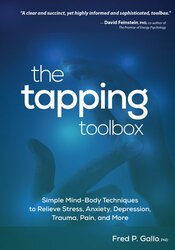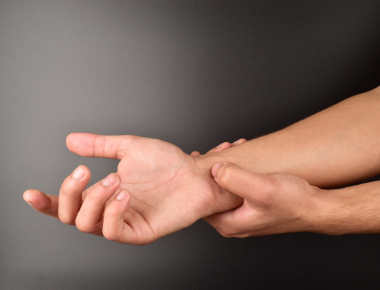Rapid Relief from Stress Through Tapping
Free printable worksheet download

Do you ever see clients that suffer from stress? Pause for everyone reading this to say βÄ€absolutely!βÄù Stress is a common experience for everyoneβÄîclients, therapists, and everyone else alike. While standard psychological methods have been proven to combat the symptoms of stress, there are instances where they do not work for everyone or in every situation. However, through tapping, a technique within the field of energy psychology, you and your clients will be introduced to natural, alternative approaches to stress relief that you can do at any time!
Stress is not just the result of situations, although situations can be involved. But our thoughts and perceptions are the primary triggers and perpetuators. And thoughts and memories (another form of thought) are not real in a concrete sense. TheyβÄôre internal words, sounds, images, smells and so on. However, the reactions to the situations and thoughts are quite real in our bodies.
A thought of danger, even if only imagined, can cause a cascade of physical reactions and emotions. These involve specific brain and bodily structures including the amygdala, hypothalamus, pituitary and adrenal glands. This is referred to as the HPA Axis (hypothalamus-pituitary-adrenal), which results in responses like the fight-or-flight reaction; changes in heart rate, blood pressure, and digestion; or variations in skin coloration. The dorsal branch of the vagus nerve can also be involved, accounting for the freeze response. There can also be a high activation of brain waves (such as gamma waves) and neurochemicals (such as cortisol and glutamate) in the stress response. Settling this stress responseβÄîand all its reactions and emotionsβÄîis top priority, especially when our state of mind is severely overwhelming.
When these states are perpetual, they are often referred to as generalized anxiety disorder, panic disorder, separation anxiety, social anxiety, phobias, PTSD, or other mental health conditions. There is both bad news and good news about this.
The bad news is that stress can be very painful and often difficult to work through, especially if ineffective strategies are applied. There is a natural tendency when we are stressed to engage in avoidance and other false comfort strategies, but this can actually perpetuate and intensify the symptoms in the long run. Even more concerning is the fact this sort of ongoing stress can be damaging to both our emotional and physical health.
But now for the good news! Because of considerable research on stress, mental health professionals have learned a great deal about the benefits of energy psychology. Tapping involvesβÄîyou guessed itβÄîtapping your fingers on different parts of your body. But you canβÄôt just tap anywhere; there are specific acupoints on your body, including under the eyes or on the arms, fingers, and collarbones. Using this technique can help us effectively manage (and even dissipate) the symptoms of stress and instill a calm and secure state of mind.
When we apply alternative strategies and techniquesβÄîlike stimulating potent points on our bodiesβÄîstress can be progressively reduced and managed over remarkably short periods of time. We can quickly learn to handle, tolerate, and even overcome severe stress reactions as the discomfort occurs. And the more you apply this approach, the more secure and capable youβÄôll feel!
Educate yourself and your clients about the alternate techniques to overcoming stress. Empower them with awareness and effective strategies, while opening discussion to help normalize their experience with ! You and your clients can confidently face stress, knowing that relief is inevitable!
offers many additional suggestions and techniques to help reduce and manage stress as well as trauma, PTSD, anxiety, phobias, depression, and even physical pain.
Stress is not just the result of situations, although situations can be involved. But our thoughts and perceptions are the primary triggers and perpetuators. And thoughts and memories (another form of thought) are not real in a concrete sense. TheyβÄôre internal words, sounds, images, smells and so on. However, the reactions to the situations and thoughts are quite real in our bodies.
A thought of danger, even if only imagined, can cause a cascade of physical reactions and emotions. These involve specific brain and bodily structures including the amygdala, hypothalamus, pituitary and adrenal glands. This is referred to as the HPA Axis (hypothalamus-pituitary-adrenal), which results in responses like the fight-or-flight reaction; changes in heart rate, blood pressure, and digestion; or variations in skin coloration. The dorsal branch of the vagus nerve can also be involved, accounting for the freeze response. There can also be a high activation of brain waves (such as gamma waves) and neurochemicals (such as cortisol and glutamate) in the stress response. Settling this stress responseβÄîand all its reactions and emotionsβÄîis top priority, especially when our state of mind is severely overwhelming.
When these states are perpetual, they are often referred to as generalized anxiety disorder, panic disorder, separation anxiety, social anxiety, phobias, PTSD, or other mental health conditions. There is both bad news and good news about this.
The bad news is that stress can be very painful and often difficult to work through, especially if ineffective strategies are applied. There is a natural tendency when we are stressed to engage in avoidance and other false comfort strategies, but this can actually perpetuate and intensify the symptoms in the long run. Even more concerning is the fact this sort of ongoing stress can be damaging to both our emotional and physical health.
But now for the good news! Because of considerable research on stress, mental health professionals have learned a great deal about the benefits of energy psychology. Tapping involvesβÄîyou guessed itβÄîtapping your fingers on different parts of your body. But you canβÄôt just tap anywhere; there are specific acupoints on your body, including under the eyes or on the arms, fingers, and collarbones. Using this technique can help us effectively manage (and even dissipate) the symptoms of stress and instill a calm and secure state of mind.
When we apply alternative strategies and techniquesβÄîlike stimulating potent points on our bodiesβÄîstress can be progressively reduced and managed over remarkably short periods of time. We can quickly learn to handle, tolerate, and even overcome severe stress reactions as the discomfort occurs. And the more you apply this approach, the more secure and capable youβÄôll feel!
Educate yourself and your clients about the alternate techniques to overcoming stress. Empower them with awareness and effective strategies, while opening discussion to help normalize their experience with ! You and your clients can confidently face stress, knowing that relief is inevitable!
offers many additional suggestions and techniques to help reduce and manage stress as well as trauma, PTSD, anxiety, phobias, depression, and even physical pain.
Discover Simple Body-Based Techniques to Relieve Stress, Anxiety, Depression, Trauma, Pain, and More!

Sometimes the key to feeling better is knowing where to tap.
Rooted within energy psychology, tapping is a mind-body technique used to treat a range of psychological, interpersonal, and physical health problems, from chronic pain and traumatic stress to athletic performance and addictive cravings.
Written by Dr. Fred Gallo, a foremost pioneer and energy psychology innovator, The Tapping Toolbox is the perfect primer for anyone looking to learn more about the philosophy and research behind tapping, as well as how to apply this simple, yet powerful, technique to resolve their most difficult problems. Written in a conversational and accessible manner, this toolbox offers the power to resolve emotional distress and connect to your innate health and wisdom that lies at the tip of your fingers.
Rooted within energy psychology, tapping is a mind-body technique used to treat a range of psychological, interpersonal, and physical health problems, from chronic pain and traumatic stress to athletic performance and addictive cravings.
Written by Dr. Fred Gallo, a foremost pioneer and energy psychology innovator, The Tapping Toolbox is the perfect primer for anyone looking to learn more about the philosophy and research behind tapping, as well as how to apply this simple, yet powerful, technique to resolve their most difficult problems. Written in a conversational and accessible manner, this toolbox offers the power to resolve emotional distress and connect to your innate health and wisdom that lies at the tip of your fingers.
Meet the Expert:
Fred P. Gallo, PhD, International Advanced Energy Psychology Trainer, shares a wealth of knowledge and his 27-year experience integrating Energy Psychology methods including EFT, TFT, and EDxTM into mainstream mental health treatment. Dr. Gallo coined the term Energy Psychology (EP) with the publication of his seminal book Energy Psychology, in which he introduced the world to EFT and several mind-body methods that produce rapid and profound results often within a single or a few sessions. Among 8 books on this topic are Energy Tapping and Energy Tapping for Trauma. He is passionate about bringing rapid and thorough EP methods into mainstream clinical mental health treatment and coaching.
Dr. Gallo obtained his PhD from the University of Pittsburgh, MA from the University of Dayton, and AB from Duquesne University. He interned at Dayton Mental Health Center in both inpatient and outpatient settings and has been on staff at local hospitals, including UPMC. His 40 plus years of clinical practice includes employment in all levels of mental health treatment and training professionals in EP approaches, including methods that he has developed. He also has a group private practice for over 40 years. He speaks nationally and internationally on this topic and presents frequently for institutes and universities worldwide. He is a sought-after expert in working with Posttraumatic Stress Disorder, anxiety disorders, depression, and chronic pain. He also applies EP in couples therapy.
Learn more about their educational products, including upcoming live seminars, by clicking here.
Dr. Gallo obtained his PhD from the University of Pittsburgh, MA from the University of Dayton, and AB from Duquesne University. He interned at Dayton Mental Health Center in both inpatient and outpatient settings and has been on staff at local hospitals, including UPMC. His 40 plus years of clinical practice includes employment in all levels of mental health treatment and training professionals in EP approaches, including methods that he has developed. He also has a group private practice for over 40 years. He speaks nationally and internationally on this topic and presents frequently for institutes and universities worldwide. He is a sought-after expert in working with Posttraumatic Stress Disorder, anxiety disorders, depression, and chronic pain. He also applies EP in couples therapy.
Learn more about their educational products, including upcoming live seminars, by clicking here.
Topic: Tapping
Tags: Advice | Somatic Interventions | Strategies | Stress | Success | Tools | Wisdom



